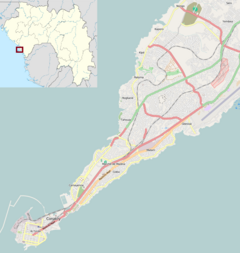The Hotel Palm Camayenne is a hotel in Conakry, Guinea. Set beside the sea, it is one of Conakry's most famous (and most expensive) hotels.[1]
| Hotel Palm Camayenne | |
|---|---|
 | |
| General information | |
| Location | Conakry, Guinea |
| Coordinates | 9°32′07″N 13°41′21″W / 9.535323°N 13.689061°W |
| Opening | 1964 |
| Other information | |
| Number of rooms | 120 |
History
editThe hotel was constructed by the Russians.[2] It is built block-style, and most of the rooms have a pleasant view.[3] Although completed in April 1964, the hotel lacked essential equipment. For example, the Russians did not supply cutlery, linen or kitchen equipment.[4] Six months later, the equipment was still missing.[5] The building was not well finished, and when the rainstorms associated with the violent tornadoes of the area came, many problems emerged requiring costly repairs.[6][7] Construction of the hotel and other projects was funded by repayable loans from the Russians, causing Guinea to fall into debt that was difficult to repay.[8]
In 1984, the military regime awarded the management contract for the 120-room Hotel Camayenne, and for the Hotel G'Bessia with 168 rooms, to the French firm Accor.[9] By 1990, the hotel, serving a clientele of business people and aid workers, was being refurbished under a line of credit provided by the Ministry of Planning and International Cooperation, using funding from the European Community.[10] The hotel remained state property, but the management contract went to SHG (Société Hôtelière de Guinée) in which the Belgian airline Sabena had a majority stake. The hotel reopened in 1993 and became a Sabena-hotel. The Belgian airline had at the time a big presence in Guinea with 3 and later 4 weekly connections with Belgium. [11] After the airline went bankrupt in 2001, the hotel remained operational under the Sabena receivership until 2006.
As of January 2011, the hotel had been closed for over five years, and required major renovations to come up to international standards.[12] When the hotel was closed, the 105 employees were laid off. When they tried to seek compensation, demonstrating in front of the hotel, the police broke up the demonstration violently. A reporter trying to cover the negotiations with the new owner was badly beaten up.[13] In December 2010, it was reported that the owner, Lebanese businessman Michel Chater, appeared to have finalized the purchase from the government, although the new president Professor Alpha Condé had said he would recover any state property that had been sold incorrectly. Chater had also taken over the grand hotel l'Unité, renamed Riviera Royals Hotel.[14] Chater, CEO of the Riviera Group, said he was committed to the hotel's rehabilitation at a cost of up to US$12 million.[12]
Location and facilities
editThe shore is rocky.[15] However, the hotel has a small beach, a swimming pool, fitness center and tennis courts.[16] The embassies of Saudi Arabia and Iran are both near to the hotel.[17] The Superbobo supermarket, also near the hotel, carries imported items.[18]
See also
editReferences
edit- ^ Jim Hudgens, Richard Trillo (2003). The rough guide to West Africa. Rough Guides. p. 564. ISBN 1-84353-118-6.
- ^ Philip M. Allen, Aaron Segal (1973). The traveler's Africa: a guide to the entire continent. Hopkinson and Blake. p. 508. ISBN 0-911974-07-5.
- ^ Sylvia Ardyn Boone (1974). West African travels: a guide to people and places. Random House. p. 139. ISBN 0-394-46154-1.
- ^ Victor Lasky (1965). The ugly Russian. Trident Press. p. 25.
- ^ "Guinea". The Economist. Vol. 213, no. 2. Economist Newspaper Ltd. 1964.
- ^ United States. Joint Publications Research Service (1972). Translations on Sub-Saharan Africa, Issues 1098-1105. p. 7.
- ^ Marshall I. Goldman (1967). Soviet foreign aid: Issue 181 of Praeger publications in Russian history and world communism. Praeger. p. 169.
- ^ Claude Rivière (1977). Guinea: the mobilization of a people. Cornell University Press. p. 120. ISBN 0-8014-0904-7.
- ^ West Africa, Issues 3489-3514. West Africa Pub. Co. Ltd. 1984. p. 2134.
- ^ Economist Intelligence Unit (Great Britain) (1990). Country report: Guinea, Mali, Mauritania. The Unit. p. 72.
- ^ "La Sabena Fait Son Nid en Guinee,Plaque Tournante du Reseau Africain".
- ^ a b "HOTEL CAMAYENNE". Horoya. 2011-01-20. Archived from the original on 2011-08-19. Retrieved 2011-03-19.
- ^ African chronicle: a fortnightly record on governance, economy, development, human rights, and environment. Vol. 6. C.P. Chacko on behalf of Asian News Chroniclers. 2005. p. 1612.
- ^ Ernest Bagoura (17 December 2010). "La session de l'hôtel Camayenne inquiète les anciens salariés". Aminata. Retrieved 2011-03-19.
- ^ Manthia Diawara (2000). In search of Africa. Harvard University Press. p. 134. ISBN 0-674-00408-6.
- ^ Anthony Ham, James Bainbridge (2006). West Africa. Lonely Planet. p. 414. ISBN 1-74059-771-0.
- ^ National Standards Association (U.S.) (2002). Worldwide government directory, with international organizations. National Standards Association. pp. 549–550.
- ^ Alex Newton, David Else (1995). Lonely Planet West Africa: Travel Survival Kit. Lonely Planet Publications. p. 456. ISBN 0-86442-294-6.
External links
edit- Official website
- "Hotel Camayenne (photo)". Panoramio. Retrieved 2011-03-19.
- "View from 4th Floor of Hotel Camayenne". tixik. Retrieved 2011-03-19.[permanent dead link]
